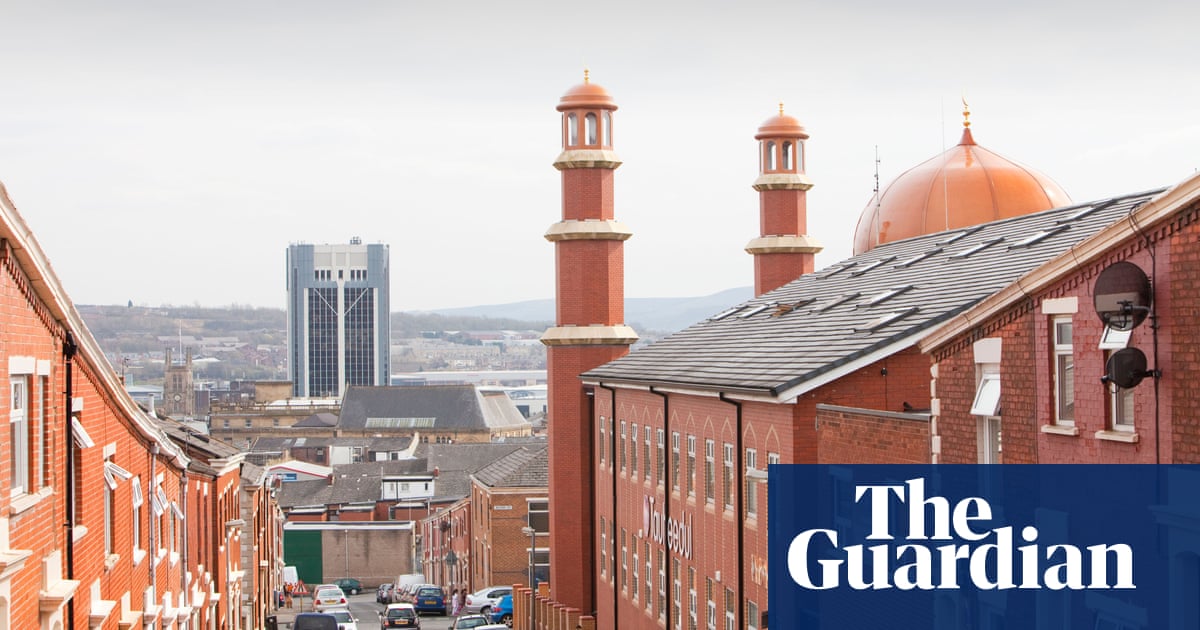
Show caption A madrasah college and mosque in Blackburn, Lancashire. The Birmingham University survey authors say Islamophobia is not treated as seriously as other forms of prejudice. Photograph: Ashley Cooper/Alamy Islam Middle-class Britons more likely to be biased about Islam, finds survey Nearly 25% in higher social groups found to be prejudiced about Muslims compared with less than a fifth of working-class people Jessica Murray Tue 25 Jan 2022 06.00 GMT Share on Facebook
Share on Twitter
Share via Email
The middle and upper classes are more likely to hold prejudiced views about Islam than working-class groups, according to a survey from the University of Birmingham.
In one of the most detailed surveys conducted on Islamophobia and other forms of racism in modern Britain, data showed 23.2% of people from upper and lower middle-class social groups harbour prejudiced views about Islamic beliefs compared with 18.4% of people questioned from working-class groups.
The survey, carried out in conjunction with YouGov, found the British public is almost three times more likely to hold prejudiced views of Islam than they are of other religions, with 21.1% of British people wrongly believing Islam teaches its followers that the Qur’an must be read “totally literally”.
“It’s the people from an upper and middle class background, who presumably are university educated, who feel more confident in their judgments but [are] also more likely to make an incorrect judgment,” said Dr Stephen Jones, the report’s lead author. “It’s almost like because they’re more educated, they’re also more miseducated, because that’s the way Islam is presented in our society.”
The findings, presented in a report entitled The Dinner Table Prejudice: Islamophobia in Contemporary Britain, were based on interviews with a sample of 1,667 people between 20 and 21 July 2021.
The survey found more than one in four people, and nearly half of Conservative and Leave voters, hold conspiratorial views about Sharia “no-go areas”, while Muslims are the UK’s second “least liked” group, after Gypsy and Irish Travellers, with 25.9% of the British public feeling negatively towards Muslims.
The survey also found 18.1% of people support prohibiting all Muslim migration to the UK, a rate 4-6% higher than the same view for other ethnic and religious groups.
The report suggested a lack of public censure for Islamophobia, citing the example of Conservative MP Nadine Dorries supportively tweeting remarks made by anti-Islam activist Stephen Yaxley-Lennon (also known as Tommy Robinson), was one reason why prejudice was so widespread.
“There’s a lack of criticism that follows Islamophobia, and that seems to correspond to the way in which Islamophobia is dealt with in public life,” said Jones. “The survey shows quite clearly it’s a very widespread prejudice. But it’s just not given the same kind of seriousness as other forms of prejudice.
“People who work in public office, whether MPs or councillors, who have got away with saying things about Muslims that they simply would not get away with if they were talking about other kinds of minority. That’s not to say those other issues don’t need to be taken seriously as well, it’s simply to say that this particular form of prejudice doesn’t get due recognition.”
Researchers recommended the government and other public figures should publicly acknowledge the lack of criticism of Islamophobia, and how it stands out compared with other forms of racism and prejudice. The report also suggested civil society organisations and equality bodies should recognise how systemic miseducation about Islam is common in British society and is a key element of Islamophobia.
Jones said: “No one is calling for laws regulating criticism of religion, but we have to recognise that the British public has been systematically miseducated about Islamic tradition and take steps to remedy this.”







